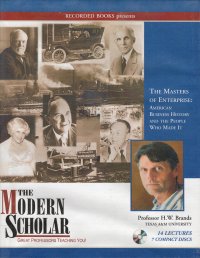 I picked this course in the Modern American Scholar line in April, and I loaded parts of it into the car for when three of our yet four headed to Arkansas for a conference, but, of course, Arkansas which means narrow, curvy two lane highways, so I could not pay much attention then. But I’ve been inventing enough reasons to drive the main vehicle with the CD changer in it to listen to the courses.
I picked this course in the Modern American Scholar line in April, and I loaded parts of it into the car for when three of our yet four headed to Arkansas for a conference, but, of course, Arkansas which means narrow, curvy two lane highways, so I could not pay much attention then. But I’ve been inventing enough reasons to drive the main vehicle with the CD changer in it to listen to the courses.
This set is 14 lectures on 7 CDs that nominally tells the stories of a dozen entrepreneurs and the businesses they built, but they actually focus on prevailing market trends and the changes in American life over the centuries and how the entrepreneurs took advantage of that. So the actual biographies of the people are generally just a paragraph or two in the lecture.
Lectures include:
- The Business of America
- John Jacob Astor: From Furs to Real Estate
- Cyrus McCormick: The Business of Agriculture
- Cornelius Vanderbilt and Jay Gould: Speculating on America
- Andrew Carnegie and John D. Rockefeller: An Obsession for Efficiency
- J.P. Morgan: The Triumph of the Money Man
- Henry Ford and Alfred P. Sloan: Capturing the Dream
- Walt Disney: The Business of Fantasy
- Robert Woodruff: As American as Coke
- Ray Kroc: The Industrialization of Eating
- Sam Walton: Will the Real Uncle Same Please Stand Up?
- Mary Kay Ash: What Do Women Want?
- Andrew Grove and Bill Gates: Intel (and Microsoft) Inside
- The Past and Future of American Business
I rather got a lot of interesting things out of it. One, the drive for innovation in the early years in the United States: It had a lot of land, and few people to work it compared to Europe. So that drove innovations in the agricultural machinery (such as Cyrus McCormick’s wheat harvester). The car makers thought demand for their product would be limited to the number of people who could afford to have drivers for their cars; Henry Ford saw that people would want to drive their own cars. And after the car was invented and people were living in cities, they had leisure time for Disney and whatnot. The inclusion of Mary Kay of Mary Kay Cosmetics is a bit of an outlier in the list because the professor wanted to include a woman entrepreneur, but there were not many to choose from and none succeeded like the men listed (although my beautiful wife has a Mary Kay dealer whose products but burnish her natural beauty). He also highlights that American business is very often speculative in ways that European and other business environments or mindsets are not.
So it’s a good survey of business history, and it does acknowledge one of, if not the business conundrums of American business: the role of government in business. The government was hands-off early in our history, but certainly started intervening more and more from the late 19th century on. Although the professor thinks that the government’s hand has been a balancing influence, staving off panics after the Great Depression, the course is dated 2003. The last 20 years have certainly seen more and more overt government intervention into the economy and probably to a deleterious effect.
But I enjoyed the course as a history course, not an economics course. That is, telling the stories from our ancestors and not too much trying to steer us to a glorious future that our betters have picked out for us.



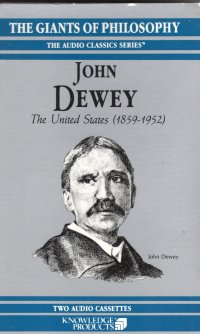 Well, gentle reader, it has taken me several years and several tries to get through this particular volume of The Giants of Philosophy series. As you might recall, I listened to several volumes in 2021 and 2022, including:
Well, gentle reader, it has taken me several years and several tries to get through this particular volume of The Giants of Philosophy series. As you might recall, I listened to several volumes in 2021 and 2022, including: This videocassette is part of a series called The History Makers which came out right before the Internet blew up. I only have one of them, this one, although the Friends of the Library Book Sale is this week, so if I get into a real frenzy on Saturday (half price day), I might pick up others for fifty cents each. But probably not.
This videocassette is part of a series called The History Makers which came out right before the Internet blew up. I only have one of them, this one, although the Friends of the Library Book Sale is this week, so if I get into a real frenzy on Saturday (half price day), I might pick up others for fifty cents each. But probably not. After watching the Indiana Jones movies
After watching the Indiana Jones movies  The
The 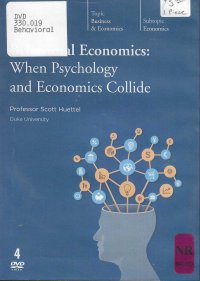 It’s been a while since I listened to most or perhaps all of this course. My beautiful wife discovered that the DVD player in our old, but newish to us, truck would “play” DVDs, but when it played them, it would not display the video on the new-then-fangled touchscreen video control. Instead, it would play the audio. Which opened us up to “listening” to DVD courses while driving. Except that the track listing was not as straight-forward as actual CDs. The track listing includes menus you cannot see, titles and whatnot, and other things. So I listened to this course in May and June, culminating in our trip to Wisconsin. But somewhere on the trip, we reached a point where we were retreading the same ground, hearing the same course again, so either we got the discs out of order or mangled returning to our place on the last lecture or three. So we removed it from the car’s audio system and went onto the next course. And then we didn’t drive anywhere of consequence. Given that my oldest son is old enough to drive he and his brother to school, and the round trip in the car is no longer an hour and a half per day, who knows when I will finish another course?
It’s been a while since I listened to most or perhaps all of this course. My beautiful wife discovered that the DVD player in our old, but newish to us, truck would “play” DVDs, but when it played them, it would not display the video on the new-then-fangled touchscreen video control. Instead, it would play the audio. Which opened us up to “listening” to DVD courses while driving. Except that the track listing was not as straight-forward as actual CDs. The track listing includes menus you cannot see, titles and whatnot, and other things. So I listened to this course in May and June, culminating in our trip to Wisconsin. But somewhere on the trip, we reached a point where we were retreading the same ground, hearing the same course again, so either we got the discs out of order or mangled returning to our place on the last lecture or three. So we removed it from the car’s audio system and went onto the next course. And then we didn’t drive anywhere of consequence. Given that my oldest son is old enough to drive he and his brother to school, and the round trip in the car is no longer an hour and a half per day, who knows when I will finish another course? The
The 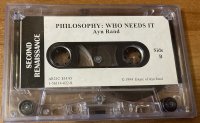 I must have bought this cassette of of eBay around the turn of the century–or did I order it directly from Second Renaissance Books back in the day? In the 1990s, Second Renaissance published a lot of Ayn Randia, and maybe you could order stuff from its catalog or from the forms in the back of its books. I know I subscribed to The Intellectual Activist (wow, that was still a going concern as late as
I must have bought this cassette of of eBay around the turn of the century–or did I order it directly from Second Renaissance Books back in the day? In the 1990s, Second Renaissance published a lot of Ayn Randia, and maybe you could order stuff from its catalog or from the forms in the back of its books. I know I subscribed to The Intellectual Activist (wow, that was still a going concern as late as 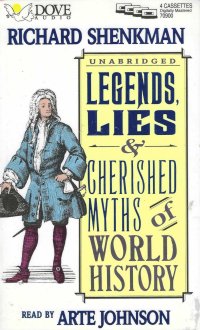 I started listening to this audiobook on the drive to and from the St. Louis area in October and finished it up last weekend on a trip to Poplar Bluff. It’s read by Arte Johnson, whose name I recognized. He was that guy on that one comedy sketch show you played a Nazi. You know, when you could laugh at Nazis instead of think they were the worst thing to compare your contemporary foibles to. No, not the “I saw nothing!” Nazi. The “Very Interesting” Nazi from Rowan and Martin’s Laugh-In:
I started listening to this audiobook on the drive to and from the St. Louis area in October and finished it up last weekend on a trip to Poplar Bluff. It’s read by Arte Johnson, whose name I recognized. He was that guy on that one comedy sketch show you played a Nazi. You know, when you could laugh at Nazis instead of think they were the worst thing to compare your contemporary foibles to. No, not the “I saw nothing!” Nazi. The “Very Interesting” Nazi from Rowan and Martin’s Laugh-In: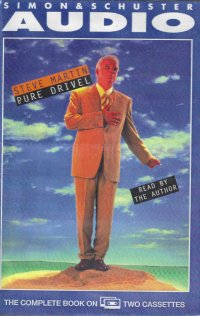 I have been holding out on you, gentle reader. And by “holding out on you,” I mean “have been lazy.” I actually listened to this audiobook the last weekend of October on the way to my boys’ last marching band festival of the year and have only gotten around to writing about it now. Which means I will have forgotten anything I really want to say about it. Actually, I don’t know if I had anything in particular I wanted to say–it’s hard to put a little sticky note into the pages of an audiobook when you’re driving 80 miles an hour down the highway.
I have been holding out on you, gentle reader. And by “holding out on you,” I mean “have been lazy.” I actually listened to this audiobook the last weekend of October on the way to my boys’ last marching band festival of the year and have only gotten around to writing about it now. Which means I will have forgotten anything I really want to say about it. Actually, I don’t know if I had anything in particular I wanted to say–it’s hard to put a little sticky note into the pages of an audiobook when you’re driving 80 miles an hour down the highway.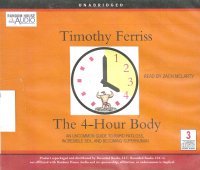 I picked this book up on the dollar side of the
I picked this book up on the dollar side of the 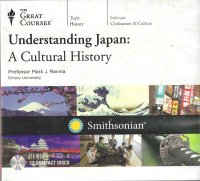 I borrowed this course from the library because I’ve only a passing knowledge of Japanese history from thin books like
I borrowed this course from the library because I’ve only a passing knowledge of Japanese history from thin books like 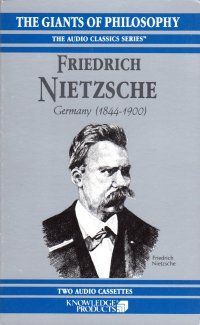 Not long after having Charlton Heston and vocal talent narrate
Not long after having Charlton Heston and vocal talent narrate 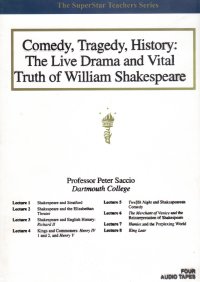 This is an old timey Great Courses/Teaching Company set of cassettes. The copyright date says 1996, but the instructor at one point talks about the 1980s as being the present time, so it might have been recorded a couple of years before the copyright date. The lectures feature a live audience, so people laugh at his jokes and you can hear them shift from time to time–and one can expect that it’s actually them applauding at the end of each lecture–a sound effect that the company has kept throughout even though you cannot hear the audience otherwise or see them on the few DVDs I have watched.
This is an old timey Great Courses/Teaching Company set of cassettes. The copyright date says 1996, but the instructor at one point talks about the 1980s as being the present time, so it might have been recorded a couple of years before the copyright date. The lectures feature a live audience, so people laugh at his jokes and you can hear them shift from time to time–and one can expect that it’s actually them applauding at the end of each lecture–a sound effect that the company has kept throughout even though you cannot hear the audience otherwise or see them on the few DVDs I have watched. I have read a couple of books on Kierkegaard (
I have read a couple of books on Kierkegaard (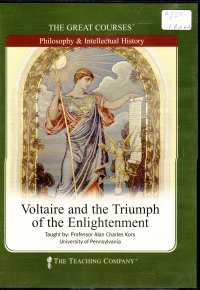 I took a break in the Charlton Heston-narrated cassettes on philosophers to listen to this Teaching Company/Great Courses series on French author Voltaire. Although I had read Candide–my beautiful wife and I took turns reading aloud from it during our courtship–I was not that familiar with him. This course certainly set me a-right. Apparently, he was the biggest European author/thinker of the 18th century, although it might be a touch exaggerated since it is a course on Voltaire, and the course slant tends to be a little homer if you know what I mean.
I took a break in the Charlton Heston-narrated cassettes on philosophers to listen to this Teaching Company/Great Courses series on French author Voltaire. Although I had read Candide–my beautiful wife and I took turns reading aloud from it during our courtship–I was not that familiar with him. This course certainly set me a-right. Apparently, he was the biggest European author/thinker of the 18th century, although it might be a touch exaggerated since it is a course on Voltaire, and the course slant tends to be a little homer if you know what I mean.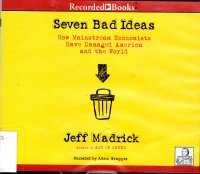 I had hoped that this would be an antedote or rebuttal of
I had hoped that this would be an antedote or rebuttal of 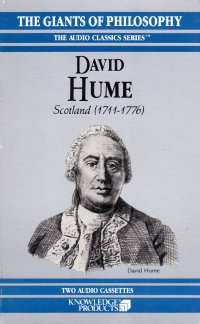 All right, all right, all right–it’s actually been a couple of weeks since I finished listening to this short, two-cassette overview of David Hume’s life and thought. This is from the Giants of Philosophy series as were
All right, all right, all right–it’s actually been a couple of weeks since I finished listening to this short, two-cassette overview of David Hume’s life and thought. This is from the Giants of Philosophy series as were  After listening the Charlton Heston narrating
After listening the Charlton Heston narrating  I listened to these lectures, er, audio books, out of order–I listened to
I listened to these lectures, er, audio books, out of order–I listened to